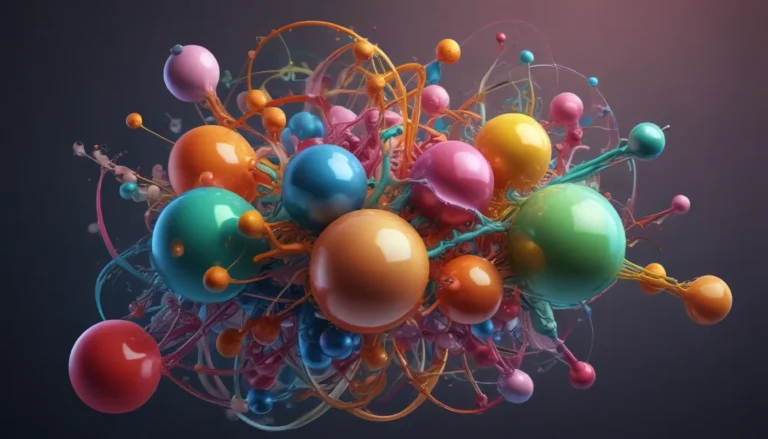A Note About Images: The images used in our articles are for illustration purposes only and may not exactly match the content. They are meant to engage readers, but the text should be relied upon for accurate information.
Welcome to the captivating world of astrochemistry, where chemistry meets astronomy to unravel the secrets of the universe. As we gaze upon the vast expanse of space, astrochemists are dedicated to exploring the chemical composition of celestial bodies, from stars to planets, moons, and beyond. Through the lens of astrochemistry, we embark on a journey through the cosmos, uncovering enigmatic facts that shed light on the origins of life and the evolutionary processes that shape our place in the universe.
Exploring the Chemistry of the Cosmos
Astrochemistry, a branch of chemistry, delves into the chemical processes and composition of celestial bodies, offering insights into the formation and evolution of these captivating objects. By studying the chemical makeup of stars, planets, and other celestial bodies, astrochemists unlock the mysteries hidden within the cosmic tapestry, providing a deeper understanding of the universe’s complex chemistry.
The Enigma of Complex Molecules in Space
Within the vast expanse of interstellar space, astrochemists have uncovered a myriad of complex molecules, including organic compounds like amino acids and sugars. Despite the harsh conditions of outer space, the exact process by which these molecules originated remains a mystery. Through ongoing research, scientists strive to unravel the enigma of the formation of complex molecules in the cosmic void, deepening our understanding of the chemical intricacies of the universe.
Spectroscopy: Illuminating Celestial Objects
Spectroscopy, a powerful tool used by astrochemists, enables the analysis of the chemical composition of celestial objects by studying the interaction between matter and electromagnetic radiation. By examining the spectra emitted or absorbed by these objects, scientists can identify specific molecules, unlocking a wealth of information about the cosmic chemistry that permeates the universe.
The Crucial Role of Stellar Nurseries
Molecular clouds, known as stellar nurseries, serve as the birthplaces of new stars, providing the essential conditions for complex molecules to form and evolve. Within these dense regions of gas and dust, the stage is set for the development of planetary systems, offering a glimpse into the intricate dance of cosmic chemistry that shapes our galactic neighborhood.
Unveiling the Secrets of Comets
Comets, icy bodies that originate in the outer reaches of the solar system, hold pristine organic compounds that provide valuable insights into the early chemistry of our cosmic surroundings. By analyzing the composition of comets, scientists glean knowledge about the chemical processes that occurred during the formative stages of the solar system, painting a picture of the celestial chemistry that paved the way for life on Earth.
Interstellar Dust Grains: Catalysts of Creation
Tiny dust grains floating in interstellar space act as catalysts, providing a surface for molecules to attach and react, facilitating chemical processes and the formation of complex organic molecules. These microscopic particles play a crucial role in the development of organic chemistry in space, serving as the building blocks for the cosmic chemistry that permeates the universe.
Bridging Chemistry and Astronomy
Astrochemistry serves as a vital link between chemistry and astronomy, combining principles from both disciplines to deepen our understanding of the universe. By studying the chemical basis of astronomical phenomena, astrochemists illuminate the intricate connections between the cosmic world and the realm of chemistry, unlocking the enigmatic secrets of our cosmic neighbors.
Astrochemistry and the Search for Extraterrestrial Life
The detection of prebiotic molecules in space offers compelling evidence of the potential for life beyond Earth, suggesting that the ingredients necessary for life may exist elsewhere in the universe. Through the lens of astrochemistry, scientists explore the possibility of extraterrestrial life, paving the way for groundbreaking discoveries that may redefine our understanding of life in the cosmos.
The Evolutionary Role of Astrochemical Processes
Chemical reactions unfolding within galaxies play a critical role in their evolution, shaping the formation of stars and the recycling of interstellar material. By understanding the chemistry behind these processes, astronomers gain valuable insights into the life cycle of galaxies, unraveling the cosmic mechanisms that govern the evolution of the universe.
The Future of Space Exploration: A Cosmic Chemistry Perspective
As humanity continues to venture into the unknown realms of space exploration, astrochemistry will play an essential role in uncovering the chemical composition of celestial objects and determining the habitability of other planets. By guiding the search for life beyond Earth and shaping our understanding of the broader universe, astrochemistry paves the way for new horizons in cosmic discovery.
Conclusion
Astrochemistry stands as a beacon of knowledge, illuminating the intricate connections between chemistry and astronomy and unraveling the mysteries of the universe. Through the study of complex molecules, stellar nurseries, comets, and interstellar dust grains, astrochemists offer profound insights into the cosmic chemistry that shapes our cosmic surroundings.
As we peer into the night sky and contemplate the wonders of the cosmos, let us remember that astrochemistry holds the key to unlocking the enigmatic secrets of our cosmic neighbors. By embracing the intersection of chemistry and astronomy, we embark on a journey of discovery, exploring the cosmic tapestry that weaves together the fundamental forces of the universe.
FAQs
- What is astrochemistry?
-
Astrochemistry is a scientific discipline that explores the chemical reactions and processes that occur in space, including the formation of stars, planets, and complex molecules in interstellar environments.
-
Why is astrochemistry important?
-
Astrochemistry is important because it helps us understand the origins of life and the universe by investigating the chemical composition of celestial bodies and studying the reactions that occur in space.
-
What are some of the key discoveries in astrochemistry?
-
Key discoveries in astrochemistry include the detection of complex organic molecules in space, the identification of chemical signatures of distant celestial bodies, and the understanding of how chemical elements are formed and distributed throughout the universe.
-
How does astrochemistry contribute to our knowledge of the universe?
-
Astrochemistry contributes to our knowledge of the universe by providing insights into the chemical processes that shape the cosmos, enabling a deeper understanding of how the universe functions and has evolved over time.
-
How does astrochemistry relate to other scientific disciplines?
-
Astrochemistry is an interdisciplinary field that combines principles from chemistry, physics, and astronomy to study the chemical makeup of celestial objects and the processes that occur in space.
-
Will astrochemistry continue to advance our understanding of the universe?
- Yes, astrochemistry will continue to advance our understanding of the universe as technology improves and our ability to observe and analyze celestial objects expands, allowing us to uncover even more insights into the chemical processes that govern the cosmos.
Astrochemistry invites us to delve into the mysteries of the cosmic landscape, offering a glimpse into the intricate interplay between chemistry and astronomy. As we continue to explore the wonders of the universe, let us embrace the enigmatic revelations of astrochemistry and celebrate the eternal dance of cosmic chemistry that shapes the cosmos.






